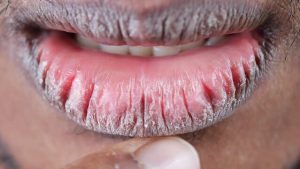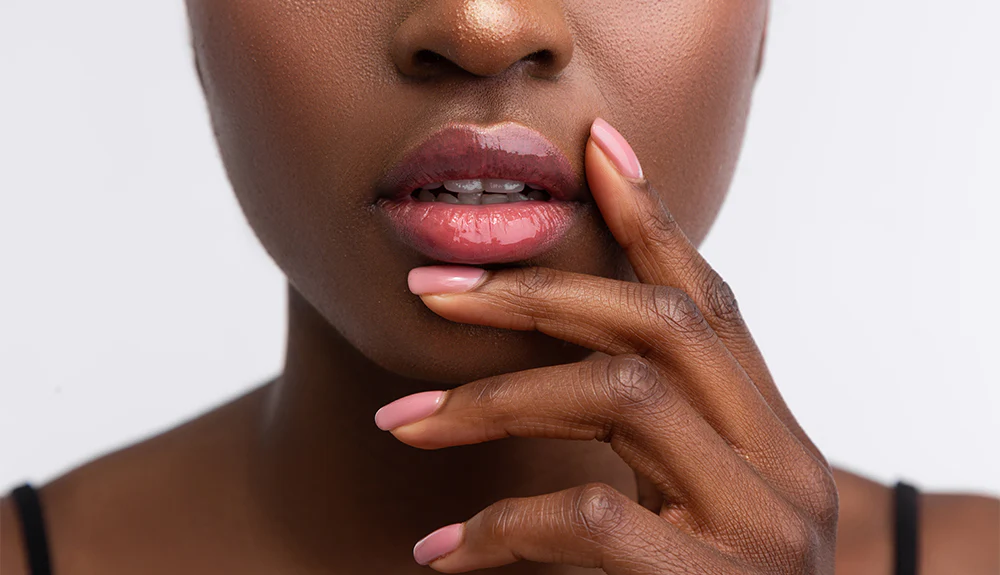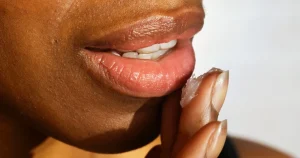
Causes Of Rough, Dry Skin Patches & How To Treat Them
May 27, 2024
Causes & Treatment Of Chest Acne & Back Acne (Bacne)
June 10, 2024Chapped lips is an overlooked curse that we often unconsciously inflict on ourselves. Think about it. When was the last time you licked your lips? Chances are it was recently, especially if they’re chapped. We don’t know how this seemingly small habit can lead to an acute or chronic case of chapped lips that can affect both lips or just one and can be downright painful. There are many possible causes of chapped skin but the right lip care routine can bring life back to even the dryest lips.
What Is Chapped Lips
Lips are considered chapped when they feel dry and cracked. If your lips burn, sting, or feel uncomfortable, they’re probably chapped. You may think of chapped lips as something that only happens to people who are ill or who don’t care for their lips. But unless you take special care, your lips can get dry, sore, and scaly at any time of the year, and for many reasons. This is especially true if you have a habit of licking or biting your lips or using products that irritate and dry out your lips.

Symptoms Of Chapped Lips
Some of the common symptoms of chapped lips include:
- Dryness,
- Cracks, peeling, or flaking,
- Bleeding,
- Redness,
- Burning, stinging, tingling, or itchiness,
- Swelling,
- Ulcers or sores inside your mouth and/or on your lips,
- Scaly texture,
- Numbness.
Causes Of Chapped Lips
While all skin needs to stay hydrated for optimal skin health, the skin on your lips is particularly susceptible to losing moisture. That’s because the skin of your lips is thinner and doesn’t contain oil glands, making it more sensitive than the skin on other parts of your body. However, several other factors can contribute to dryness, such as:
- Health conditions – Some medical conditions including vitamin deficiencies, autoimmune disorders, allergies and allergic reactions may cause your lips to become chapped. In this case, a visit to your dermatologist or primary care physician if you have health concerns can help.
- Weather – The temperature and weather can influence your lips’ moisture content. Very hot, cold, windy or sunny climates can all cause dryness.
- Age – As a result of the absence of oil glands in the lips, ageing could increase the dryness of lips. Layering mature skin of the lips with oil-based lip care products like the Kanda Lip Balms offers a strong alternative to regular lip glosses by helping to replenish natural oils that the skin typically loses with age.
- Strong Medication – Taking certain medications (like antibiotics, diuretics, statins, retinoids, drugs used for chemotherapy, vitamin A, digoxin, and lithium).
- Dehydration – Not drinking enough water can dehydrate your whole body, lips included. You might be tempted to lick your lips when you’re thirsty, but that can exacerbate the irritation. It only makes your lips feel better temporarily — eventually, it dries them out even more and can also lead to lip licker’s dermatitis, which appears as a rash around the edges of the lips.
Prevention Of Chapped Lips
The best way to prevent chapped lips and keep your lips healthy is to avoid chapping them in the first place with a strong lip care routine that:
- Shields your lips from the sun – You should wear lip balm that contains sun protection ingredients. Keep your lips moist and protected by using the Kanda Cocoa Lip Balm. It’s silky enough to be worn under your lipstick and other makeup and gives your lips a silky look. You might want to re-apply it every two hours if you’ll be outside for the day or after eating and drinking.
- Soothes your skin – Closely read lip balm labels and look for natural nourishing ingredients that can help heal lips, such as shea butter and cocoa butter. For instance, the Kanda Cocoa Lip Balm contains cocoa butter and other natural oils as ingredients that help the healing of wounds.
Treatment Of Chapped Lips
There are many ways of treating chapped lips at home and they include:
- Drinking enough water daily – There are numerous benefits of drinking water for your body. One of which is to help the body avoid the dehydration that leads to chapped lips.
- Using a humidifier indoors – Humidifiers provide the moisture your skin (including your lips) crave. It’s great to have one at work as well as at home, especially if your spaces are always air-conditioned and cool. In this case, you should turn it on at night to replenish your skin while you sleep.
- Avoiding to lick your lips – While it might seem like a good idea at the time to lick your dry lips, running your tongue over your lips is the worst thing you can do for them. This is because as your saliva dries, it takes more moisture from your skin. Reach for your lip balm instead.
- Avoiding to peel or bite flaky skin – The skin on your lips is thin and delicate. Picking at it can cause it to bleed and hurt, slow the healing process, and cause more irritation which you don’t need.
- Avoiding to exfoliate – Exfoliating is great, but in this case, it can cause further damage to chapped lips. Instead, apply plenty of balm or ointment and turn on the humidifier.
- Using non-irritating lip balm – A good balm can protect the skin of your delicate lips from the elements. Choose one high in emollients that will lock in moisture, and seal off cracks and splits in drying lips. Don’t limit yourself to products with the word “balm” in them, either.
Products And Ingredients That Worsen Chapped Lips
While doing the above to treat your chapped lips, to help them heal, you should stop applying lip products that contain any of the following:
- Camphor,
- Eucalyptus,
- Flavourings such as cinnamon and citrus can be especially irritating to dry, chapped lips,
- Fragrance,
- Lanolin,
- Menthol,
- Octinoxate or oxybenzone,
- Phenol (or phenyl),
- Propyl gallate, and
- Salicylic acid.
Products And Ingredients That Heal Chapped Skin
While some ingredients can irritate dry, cracked lips, others can help them heal. When looking for products to use on your chapped lips, it is advisable to use products that contain one or more of the following:
- Castor seed oil,
- Ceramides,
- Dimethicone,
- Hemp seed oil,
- Mineral oil,
- Petrolatum,
- Shea butter, and
- White petroleum jelly.
Caring For Your Lips
Knowing how to prevent chapped lips all year long may come down to adjusting your usual lip care routine. No matter whether the temperatures are rising or dropping, prioritise wearing moisturising lip balm daily. This will seal in moisture and provide a layer of protection from environmental elements. Keep it with you on the go, too.
You can also raise the moisture content of the air around you with a humidifier, particularly if your house or office are constantly air-conditioned and cool. Stay hydrated internally as well — drink plenty of water alongside your skincare routine and throughout the day to keep lips soft and supple no matter the weather.


